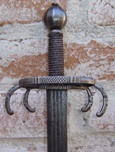My experience in the antique side of things the past three years is that what used to hammer at 2-3K a few years back is now going off at 4-6K. I went to Bonhams this past fall and came away empty handed. I heard the same from folks who were at Oxford just a few weeks back. Prices have really shot up just recently. However in 2007 I did manage one decent purchase for myself that might be of interest to folks here. This is a 17th century european broadsword with a late renaissance styled hilt. At first I was a bit nervous about it as most swords I have seen with similar hilts have been married originally to rapier blades. However, I now am 90% certain the blade is original to the hilt for three reasons:
1. The sword (hilt +blade) weighs in at 1240 grams very similar to other complex hilted broadswords of the period
2. The POB for the sword is right where the blade profile narrows 5 inches down from the hilt
3. the hilt itself is somewhat different than others of its type married to rapier blades that I have seen, having three rings and no plate , and protection for the hand is on one side only
The blade is 33 inches long and the sword is 38.5 inches. The blade geometry is hexagonal with chamfered edges and with three well cut fullers down a wide blade center . The last 6 inches from the tip the chamfered edges disappear and it is very much a flat oval, very lenticular. As mentioned before, the upper 5 inches of the blade has a swelled profile at the forte and is 1.7 inches wide at the hilt. The tip is rounded. There are stamps to the blade which I have not yet identified (any help would be much appreciated).
This sword handles very well in hand, is very well balanced and feels much like a cutter rather than a thrusting sword. On the other hand, with that hilt it is hard to think of this as a horsemans sword either. The steel blade when closely examined has a lamellar character with some texture from carburized zones which is typical of the 17c 'shear steel' made from iron enriched by the cementation process. Overall this is a very interesting sword.
pictures can be found here
http://i196.photobucket.com/albums/aa160/shinumo/DSC01244.jpg
http://i196.photobucket.com/albums/aa160/shinumo/DSC01245.jpg
http://i196.photobucket.com/albums/aa160/shinumo/DSC01249.jpg
http://i196.photobucket.com/albums/aa160/shinumo/DSC01247.jpg
